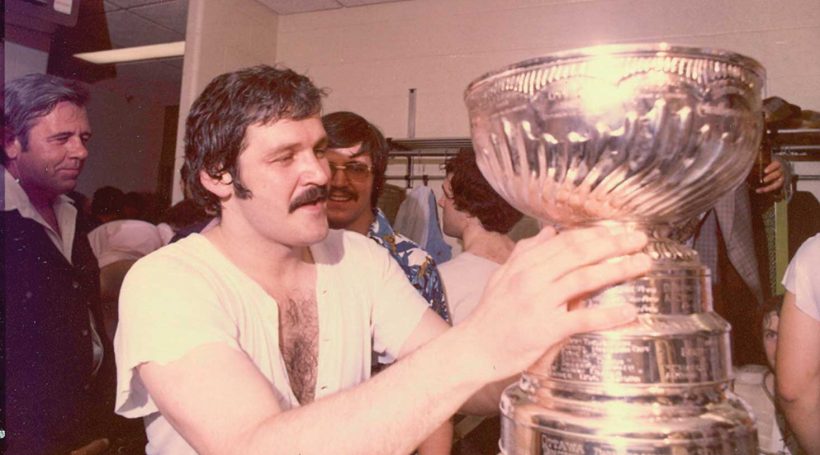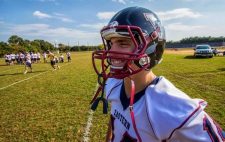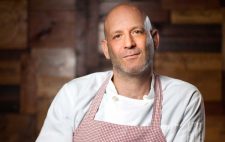Bernie Parent is one of the most revered players in Philadelphia Flyers history. A member of the legendary Broad Street Bullies, Parent was goalie the only two times the team won the Stanley Cup – in 1974 and 1975, earning MVP both years. Today, the hockey hero has turned his focus to teaching about happiness and success. An author, public speaker and business coach, Parent spends much of his time talking about what it takes to create a satisfying life – and that includes a good amount of hugging.
You believe how people greet each other makes a big difference in the world. How do you greet someone?
When I see a stranger, I look them in the eyes, put my hand on their shoulders and ask, “How are you doing today?” That’s very, very powerful, and there’s not enough of that today. I also hug people as much as I can. And I hold the hug for a few seconds.
If you are on the receiving end of that and you pay attention to how it makes you feel, then you start sharing that and it grows and grows and grows.
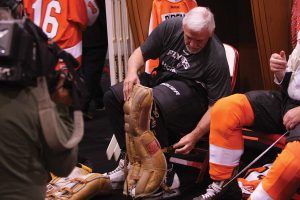

One of your books is called “Journey Through Risk and Fear.” What was a significant risk you took?
When I was 17 years old, I got drafted by the Boston Bruins and had to go to Niagara Falls. It was about 400 miles from Montreal, where I was living, and no one spoke French there. I got my suitcase, got on the train all by myself and went to Niagara Falls. Was it risky? Downright. Scary? You bet. I asked myself for quite a few years why I went. Heck of a question, you know. I didn’t know at the time, but finally it came to me. It was because I had a purpose, and my purpose was to play in the National Hockey League. If I didn’t have that purpose, I would have stayed with the safety of my home and friends. And of course, I would have missed out on my whole career.
Do you think everyone is capable of finding their purpose?
Yes. They’re capable because everybody has a passion, and everybody can define their passion. Your passion is what you love to do. And people will say, “But I can’t do this, it looks impossible.” What I tell those people is when you take the first step forward toward your purpose, that’s when the magic happens. People you don’t even know exist will come into your life to help you realize your purpose.
Do you have any tips for trying to stay positive?
I believe you should write down maybe 10 different things that you love and enjoy in life. It could be bowling, playing tennis, hunting, whatever. When you’re sad and not feeling good, ask yourself, “What am I thinking about?” Once you know, you can change your thinking. Think about something from the list, something you know you love. Refocus your mind and become happy again. Change the negative to the positive. A happy mind brings happy results.
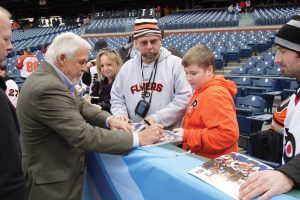

You often speak to groups of high school students. What is your message to them?
I tell them to ask themselves one big question: “What would I love to do for the rest of my life?” Don’t ask “How much can I make? Who I can work for?” What is it that you would really love to do for the rest of your life? Sad to say, they don’t teach that in school, and that’s a big problem. I spoke at a high school just before summer, and I talked to about 250 kids. I asked them the question, “What’s your purpose?” These kids – who are all going to college this fall – are looking at each other and had no clue what I was talking about. Then one kid stood up, raised his hand, stood up and said, “How do you define purpose?” It’s a great question. I said, “Go home and think about what you would love to do for the rest of your life. That’s your purpose. If you have a purpose, when you come against a lot of barriers in life, you’ll plow through them because you want to reach your purpose.”
You’ve said that while education is important, imagination is more important. Why?
The place education can take you has a ceiling, but imagination can take you to the moon. You can do anything. A prime example: if I want to feel good when I’m driving, I love to listen to different songs. You know what I do? If a song comes up and I’m really into it, suddenly I’m on the stage, singing in front of 60,000 people. By the time the song is over, I’m so freakin’ pumped it’s incredible. Imagin-ation is stronger than education. Look at Henry Ford. He had a second-grade education, and look what he did.
You have a summer goalie camp for kids in Pennsylvania, and you attend every day. Why do you spend so much time there?
I’m there every day for a week, and I spend the whole day there. I love it. I love kids. Do you know why? Because you and I are programmed to live in the past or the future. We worry constantly: Am I going to have enough money? Am I going to stay healthy? When am I going to die? Kids live in the present. When you are worrying, go to the park and spend a half hour looking at kids. Watch them live in the present moment. They don’t do the same thing the whole day. They might do something for a half hour, then get tired of it and something else becomes a present moment. That’s why kids have fun in life. Most adults have moved away from that.
What was it like to play in the NHL Winter Classic after 34 years off the ice?
[My business partner] wanted me to play in the game, and I told him to go to hell for a whole week. Finally I said, “Let’s get the equipment and play.” I practiced three or four times, and then went on the ice in front of 45,000 people. Think about this. I was scared to death. I was scared because I love the people in Philly, and I wanted to do well. I only played five minutes, and the feeling I had when I skated off of the ice was the same feeling I had 40 years ago. If I had played it safe, I would have been on the sidelines waving to the crowd. There’s no way I would have had that feeling. Because I took the risk and faced the fear, I got the reward of feeling fantastic.
What do you think of the Flyers today?
When you look at sports properly, you have hills and you have valleys, and it’s what you do when you’re in the valleys to get back up on top of the hill that makes a difference – isn’t that the way life is? That’s what I admire about the Flyers. Prime example of this was back in 1967 when we played against the St. Louis Blues. I’ll never forget this – they kicked our ass. I’ll never forget Ed Snider banging his fist on the table and saying, “We’ll never go through this again.” We hit bottom. We got beat, and we lost the seventh game in the playoffs. But then we changed direction. They brought in Dave Shultz and Bob Kelly, and we went in a direction that took us to the Stanley Cup. So hitting bottom isn’t bad if you pay attention to where you’re going. The Flyers have a good core of young players, and I think they’re headed in the right direction.
Do you still feel a bond with Flyers fans?
Definitely. I love the people. Before the game when we won the Stanley Cup in 1974, Fred Shero – former Flyers coach – wrote on the blackboard in the locker room: “We win tonight, we walk together forever.” At the time, we looked at this and thought about the players and the organization, but today I know it’s different. It’s still the players and the organization, but today I realize it was meant for the whole Delaware Valley. We are walking together.


